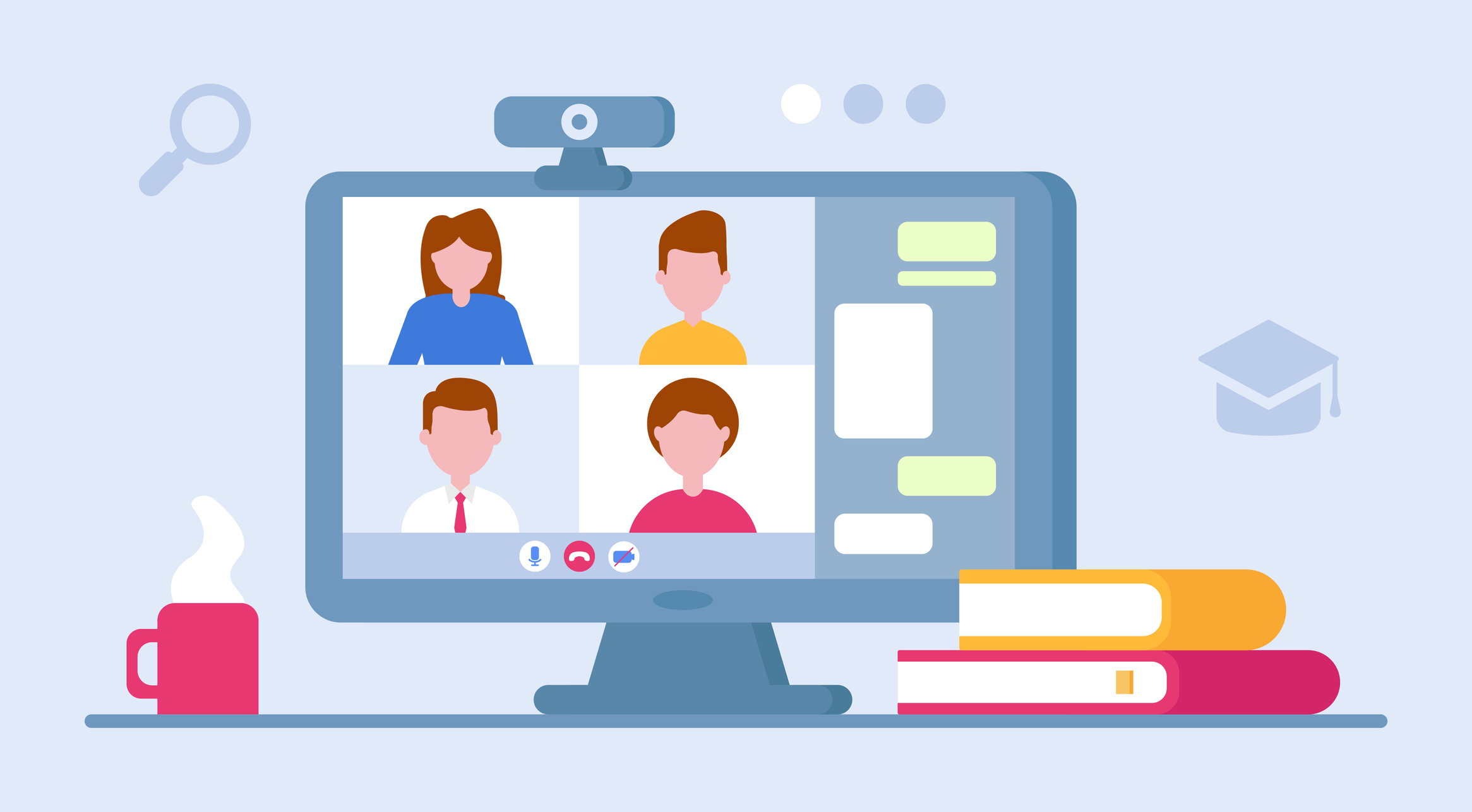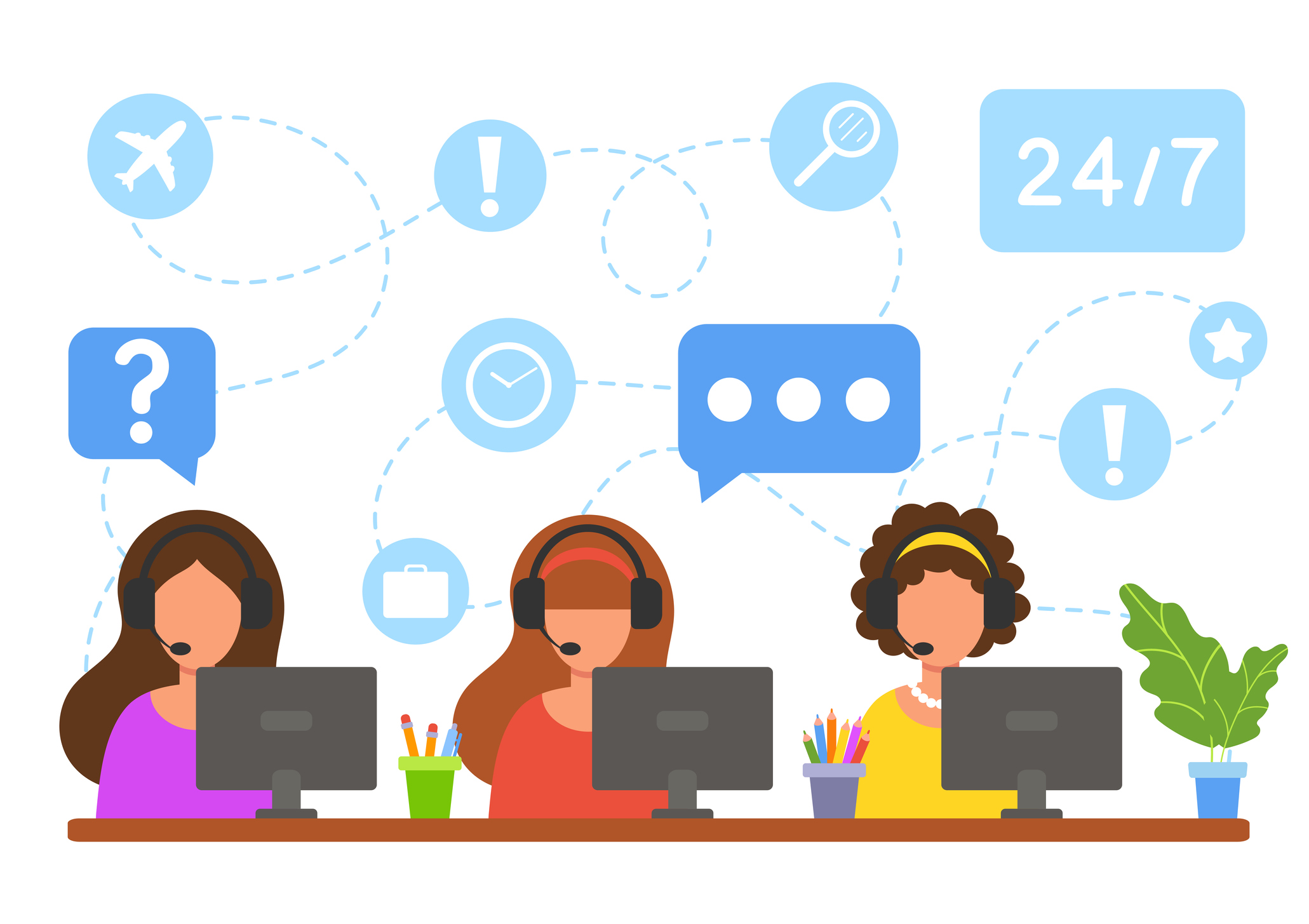Featured
Contact Centers for Higher Education: A Complete Guide
by Kent Mao | Published On June 10, 2024

Higher education contact centers are essential in managing communications, providing support, and enhancing the experiences of students, alumni, and staff.
Contact centers are essential in every industry, no matter which industry you serve. If you need to interact with people to answer questions, address concerns, or build long-term relationships, having the right contact center solution is critical.
In higher education, contact center solutions give colleges and universities a central hub where they can manage admissions and enrollment, respond to student inquiries, and even engage staff members and alumni.
In this guide, we’ll explore the many benefits and use cases of contact centers for educational institutions as well as how to choose the right contact center for your needs.
What is an Education Contact Center?
A contact center is a department within an organization that manages external communications, such as phone calls, emails, and live chat. In an education contact center, employees use technology to interact with many different groups of people, including alumni, prospective and current students, parents, suppliers, and partners.
Keep in mind, a contact center isn’t the same as a traditional call center. While call center solutions focus on giving companies the tools they need to manage conversations over the phone, contact centers enable the use of a wide range of communication channels.
Modern-day contact centers act as a hub for everything from phone calls to email, live chat, social media, video, and SMS interactions. This ensures universities and colleges can cater to the diverse communication preferences of their community.
Types of Education Contact Centers

Over the years, contact centers have evolved. Today, there are many different types of contact centers as consumers adopt new modes of communication, such as text and social media messaging.
Omnichannel vs. Multichannel Contact Centers
Not every contact center takes the same approach to unifying their communication channels. For example, a multichannel contact center allows college and university staff to connect with customers across various channels, such as phone, email, social media, and live chat. However, these channels operate independently of each other, with little to no integration between them. This means that a customer might have to repeat their issue if they switch from one channel to another, as the information from one channel is not automatically shared with another.
The multichannel approach focuses on offering numerous ways for customers to interact with the contact center but does not necessarily provide a seamless or integrated experience across those channels.
The other type of contact center is known as an omnichannel contact center. In an omnichannel contact center, all the channels of communication are aligned, allowing for the continuity of conversations regardless of the platform the customer uses.
For example, if a customer starts an interaction through a live chat and later decides to continue the conversation over the phone, the service representative will have access to the complete interaction history, ensuring a smooth transition and a more personalized experience. This reduces data silos and inefficiencies within the contact center and ultimately leads to a more consistent customer experience.
On-Premises vs. Cloud vs. Hosted
The way that educational institutions deploy their contact centers can vary. On-premises, cloud, and hosted are the 3 different models for deployment.
- On-premises: On-premises contact centers are deployed and managed within the physical premises of a college or university. The school owns and maintains all the hardware and software required for the contact center operations. This model offers greater control over the infrastructure, data security, and customization. Educational institutions can tailor the system to their specific needs and requirements. However, on-premises contact centers require significant capital investment in infrastructure, as well as ongoing costs for maintenance, upgrades, and IT support. They may also lack the flexibility and scalability that hosted or cloud solutions offer, making it harder to adapt to changing business needs.
- Cloud: Cloud contact centers are entirely web-based solutions. They are hosted on servers that are accessible over the internet, commonly referred to as “the cloud”. They typically offer contact center functionalities through a monthly, subscription-based model. Cloud contact centers provide high scalability, flexibility, and cost-effectiveness, as schools can easily scale their operations up or down based on demand. This model eliminates the need for significant upfront investments and reduces the burden of maintenance and updates, as the cloud provider handles all of that.
- Hosted: Hosted contact centers involve deploying contact center solutions on dedicated hardware and software hosted by a third-party provider. These solutions are often tailored to the specific needs of the educational institution and can be customized extensively. The third-party provider manages the physical infrastructure, while the college or university accesses the services over the internet. Hosted solutions might still involve some on-premises components or require specific hardware setups. This model can offer greater control over the configuration and customization of the contact center, but it may also come with higher costs for maintenance and upgrades.
Key Functions of Education Contact Centers
Education contact centers serve a variety of key functions to support the goals and operations of colleges and universities. Their primary functions include:
Addressing Common Queries for Students and Parents
The most common way that colleges and universities use contact centers is to answer common questions their community might have. Parents, alumni, and prospective students often have numerous questions to ask about things like admission procedures, financial aid opportunities, and academic program details.
Since employing enough agents to address these queries full-time would be expensive, many educational institutions leverage contact center technology to automate the process.
Interactive Voice Response (IVR) systems can help students and parents find answers to their questions, by letting them navigate and select from a menu of options. More advanced IVR systems can use natural language processing and voice recognition technology to immediately identify and respond to common questions without human intervention.
Chatbots allow colleges and universities to offer 24/7 service to their community. These solutions use artificial intelligence, natural language processing algorithms, and machine learning to deliver intuitive responses to questions on various channels, like websites, social media platforms, and mobile apps.
Managing Administrative Processes
Contact center technology also plays an important role in facilitating different administrative processes. For example, universities and colleges can use contact centers to collect payments or funding applications from students. They can also use contact centers to record and process admissions requests, answer questions about course schedules, and create student timetables.
What’s more, contact centers allow schools to communicate seamlessly with students about scheduling conflicts, course cancellations, and changes to lesson plans.
While AI tools can help automate many of these processes, schools may still rely on human agents to guide prospective students through complex processes, like applying for certain forms of financial aid or student accommodation.
Supporting Staff Members
Besides facilitating communication with students, parents, and alumni, contact centers also help with servicing the needs of internal team members and staff.
Many universities and colleges use their contact centers to provide a help desk for employees, allowing team members to request technical assistance, ask questions about payroll and benefits, or check up on internal policies and business changes.
Education contact centers can even offer IT support, helping teams troubleshoot hardware and software issues, reset passwords, and report security concerns. Some cloud-based contact center solutions can also integrate with workforce management tools and unified communication platforms.
The right contact center technology can facilitate communication among various departments and even serve as conduits for sharing important announcements, updates, and resources.
Enabling Outbound Communications
Often, communication between educational institutions and their communities needs to go both ways.
Education contact centers with outbound campaign features allow schools to share information about upcoming events, campus closures, and emergency situations. Through various channels such as email, text, and even automated voice calls, contact centers can ensure this key information reaches both students and faculty members in a timely manner.
Some educational groups even use their contact centers to share information about new courses with alumni, remind individuals of important deadlines or appointments, or invite students to take part in new educational experiences.
Potential Use Cases of Education Contact Centers

Wondering what else a contact center can do for your organization? Here’s a comprehensive list of different use cases for contact centers in higher education:
- Admissions Enquiries: Help manage inquiries from prospective students about course options, application processes, deadlines, and entry requirements. The software can assist with routing calls to the appropriate admissions officer and provide information quickly through automated responses.
- Student Support and Services: Contact centers provide a central hub for current students to access information about scholarships, financial aid, registration, and academic advising. Contact center software can help efficiently manage these inquiries, ensuring students receive timely and accurate information.
- Technical Support: Contact centers can facilitate technical support for students and faculty using online learning management systems (LMS) and other learning platforms. Contact center software can help resolve issues faster through features like screen sharing and remote desktop access.
- Alumni Relations: Help enhance communication with alumni by managing outreach programs, updating contact information, and promoting events. Contact centers can also be used to handle fundraising campaigns and maintain engagement with the school’s alumni network.
- Campus Health Services: Facilitate communication between students and health services, including scheduling appointments, answering health-related queries, and providing information about wellness programs.
- Library Services: Assist students and faculty with library services such as book reservations, renewals, and information about available resources. Contact centers can also automate routine inquiries and free up library staff to handle more complex questions.
- Facilities Management: Contact centers can be used to coordinate maintenance requests and manage reports of campus facilities issues, from classroom equipment malfunctions to dormitory repairs. The software can track these requests, route them to the right department, and provide status updates.
- Event Management: Help manage registrations and inquiries for campus events such as seminars, workshops, and cultural activities. The software can provide automated responses to common questions and facilitate easy communication between organizers and participants.
- Crisis Management: Serve as a critical communication hub in times of campus emergencies, such as natural disasters, security threats, or health crises. Contact center software can rapidly disseminate information and coordinate responses across campus and beyond.
- Research Support: Provide support for research activities by managing communications related to research grants, project collaboration opportunities, and compliance requirements.
What to Consider When Choosing a Contact Center
Every college and university will have unique priorities to consider when choosing a contact center solution. Depending on your goals and current technology investments, the features you need from a contact center solution can vary.
Here are some important factors to consider when making your decision:
Integrations with Existing Tools
The ideal contact center should integrate seamlessly with the technology your employees already use for communication and collaboration. For example, if you use Microsoft Teams for internal communication between faculty members, you might benefit from a contact center that integrates with the Teams platform.
Additionally, if you plan to use your contact center as a help desk for internal staff, you may want a contact center solution that integrates with workforce management and engagement tools.
At a minimum, your contact center should integrate with your Customer Relationship Management (CRM) technology, which many schools already use to manage their student database. By integrating your contact center with your CRM platform, you can ensure you’re collecting and storing valuable information about students and their interaction history.
Essential Communication Channels
Consider what channel students and parents prefer when contacting your organization. While phone calls are still a common way to communicate, many students and young adults say they prefer asynchronous communication methods such as social media, web chat, and text/SMS. These channels are often considered more convenient and flexible by younger generations.
Ensuring your contact center not only supports these channels but also integrates the data into an omnichannel database will help you deliver a better experience for students and staff alike. When selecting a contact center solution, it’s also a good idea to consider what channels can be added in the future if you decide to expand.
A cloud-based contact center will generally give you more flexibility than a hosted or on-premises solution, allowing you to adapt quickly to changing market dynamics and customer preferences.
The KPIs You’ll Be Tracking
Key performance indicators (KPIs) are the essential metrics you’ll need to monitor to ensure your contact center is operating efficiently and generating a positive return on investment (ROI). While the KPIs you prioritize may differ, most colleges and universities will need to track things like abandonment rates, average call handling time, and average wait times.
Ensuring your contact center has the analytical and reporting tools in place to monitor these metrics will help you consistently optimize your contact center processes over time. Some contact center solutions even allow you to monitor metrics in real-time, making it easier for agents and employees to adapt their approaches to improve customer satisfaction.
When choosing a new contact center, start by identifying the KPIs that matter most to you. Make sure any solution you choose has the tools you need to keep track of these KPIs and optimize their performance.
For example, adding chatbots to your contact center can help to reduce wait times and abandonment rates. Also, providing employees with agent assist tools, which surface helpful information during a call, can help minimize call handling times.
PCI Compliance and Security
Colleges and universities need to adhere to strict compliance standards, since much of the data they collect is private and sensitive. One particular area of compliance to prioritize is PCI-DSS, which is a set of standards that helps maintain security of credit card information.
If your college or university collects credit card payments for donations, tuition, or other fees, you’ll need a contact center that is PCI compliant. It’s also important to make sure your contact center offers the latest in security technology, such as robust access controls and data encryption protocols.
Advanced Features and Functionality
Finally, it’s worth looking at the more cutting-edge features being offered by some contact center vendors, which can potentially improve student engagement and staff productivity. Some of these features include:
- Artificial Intelligence: AI solutions such as chatbots, intelligent IVRs, and agent assist tools can help enhance self-service experiences and improve data collection and analysis. More advanced AI systems can assist students with everything from course enrollment and fee processing to multilingual queries.
- Workflow Automation: Solutions that allow universities and colleges to automate certain processes, like uploading data to a CRM, call recording, and call transcription can help reduce costs and lead to a better ROI.
- Survey Tools: Surveying tools allow schools to gather feedback from students and alumni, which they can use to optimize future processes, enhance course curriculums, and differentiate themselves from the competition.
Why Choose ComputerTalk?

ComputerTalk has been providing innovative contact center solutions to colleges and universities for decades, helping them to streamline communications, improve relationships with students, and reduce operating costs.
Our flexible cloud-based contact center offers a comprehensive solution for omnichannel customer service, seamlessly connecting multiple channels and integrating with a range of crucial tools, from CRM systems to workforce management tools.
What’s more, colleges and universities can take advantage of a wide range of versatile modules for things like:
- Recording, transcription, and conversation analysis
- Outbound campaign creation and management
- Intelligent interactive voice response
- Automated survey management
- Workflow design and implementation
- AI-powered chatbots
- Real-time reporting and analytics
With 100% of our support and infrastructure staff based in North America, we offer a comprehensive and consistent level of support to all educational institutions. ComputerTalk is also a certified Microsoft Partner, which means we can integrate your contact center with the entire Microsoft suite of products, including Microsoft Teams and Microsoft Dynamics 365.
Connect with us today to discover why our contact center is trusted by leading colleges and universities across North America.
More from our blog
 When you think of contact centers, you might just think of agents answering customers’ questions about products or services. While this is one common use case for contact centers, that’s not all they do.
When you think of contact centers, you might just think of agents answering customers’ questions about products or services. While this is one common use case for contact centers, that’s not all they do.
.png?sfvrsn=946021e5_1) Discover key strategies to enhance customer journeys with effective touchpoint analysis and customer experience enhancement.
Discover key strategies to enhance customer journeys with effective touchpoint analysis and customer experience enhancement.
 Your contact center and your Customer Relationship Management (CRM) tool are a lot like peanut butter and jelly – both great on their own, but even better together.
Your contact center and your Customer Relationship Management (CRM) tool are a lot like peanut butter and jelly – both great on their own, but even better together.

